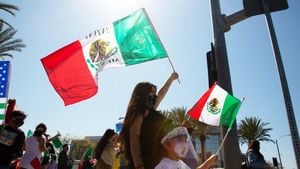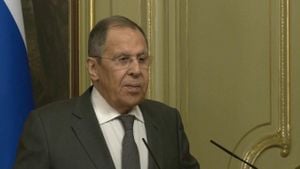The plight of Palestinian workers continues to escalate amid increasing tensions and crackdown from the authorities. Reports indicate significant numbers of arrests targeting these workers, particularly in cities like Yafa and Tel Aviv, raising alarms about the impacts of occupation on their livelihoods.
Shaer Saad, the Secretary-General of the Palestinian Workers Union, recently condemned the intensified campaign against Palestinian laborers, noting it has systematically affected their rights and comfort. Just this week, Israeli police efforts led to the arrest of 15 workers, adding to the staggering total of about 546 since the beginning of the year. This alarming figure reflects the broader challenges faced by workers desperate to earn a living but often subjected to severe restrictions and pressures.
Saad elaborated on the situation, explaining how these arrests come not just from legal actions but are also accompanied by police raids targeting shops and businesses. He criticized the characterization of many workers as illegal, which only serves to marginalize them and subject them to harsh penalties. "Deterioration of their conditions due to chaotic policing tactics is leading to increased hardship and even forcing them to seek opportunities elsewhere," Saad stated. This harsh environment, stressing personal and economic survival, paints a grim picture of the consequences faced by Palestinian workers.
Alongside these arrests, reports of significant fines imposed on employers also surfaced, indicating the heavy pressure placed on the local economy. Employers who are caught hiring these workers face hefty penalties, making it increasingly difficult for businesses to operate within the current legal framework imposed by occupational forces. Saad outlined the risks: "These actions are intended to starve the Palestinian people and restrict our freedom to work and earn," reflecting the frustration shared by many affected individuals.
The international community has not remained silent on these issues. Rights organizations and labor unions alike have been criticized for not doing enough to confront these violations. Saad called upon international human rights institutions and the International Labour Organization to take immediate action. "We urge these bodies to step forward, document the breaches we face, and bring them to light on global platforms. Our workers deserve recognition and support against these oppressive practices," he insisted.
This struggle is framed against the backdrop of broader violence and turmoil affecting the region, particularly from the recent escalation of events resulting from conflict within the Gaza Strip. Saad referenced grim statistics, reporting approximately 70,000 casualties and150,000 injuries after months of turmoil. The destruction of infrastructure — hospitals, schools, and community centers — has compounded the dire situation for Palestinians, exacerbated by the economic blockade restricting movement and access to resources.
Total deprivation now characterizes life for roughly 300,000 workers (those trying to access work across the Green Line). Many of them are routinely faced with closed borders and intimidation, causing distress and leading to dire choices about their futures. The demands for systemic changes around labor rights are not just calls for assistance; they echo the aspirations of many for dignity, survival, and dignity amid adversity.
Saad's closing remarks capture the significant urgency felt by many. "The numbers we face signify human suffering; we are at a crossroads where action is needed now more than ever," he urged. The intersection of human rights and worker rights must remain at the forefront of international discourse, ensuring stories like these move from obscurity to urgent call for action.
With the backdrop of growing uncertainty and fear among workers, the call for action reverberates from the Palestinian streets, demanding acknowledgment and change from the global community. The future of these workers is contingent not only on local infrastructures but increasingly on international responses to the realities they are forced to endure.



